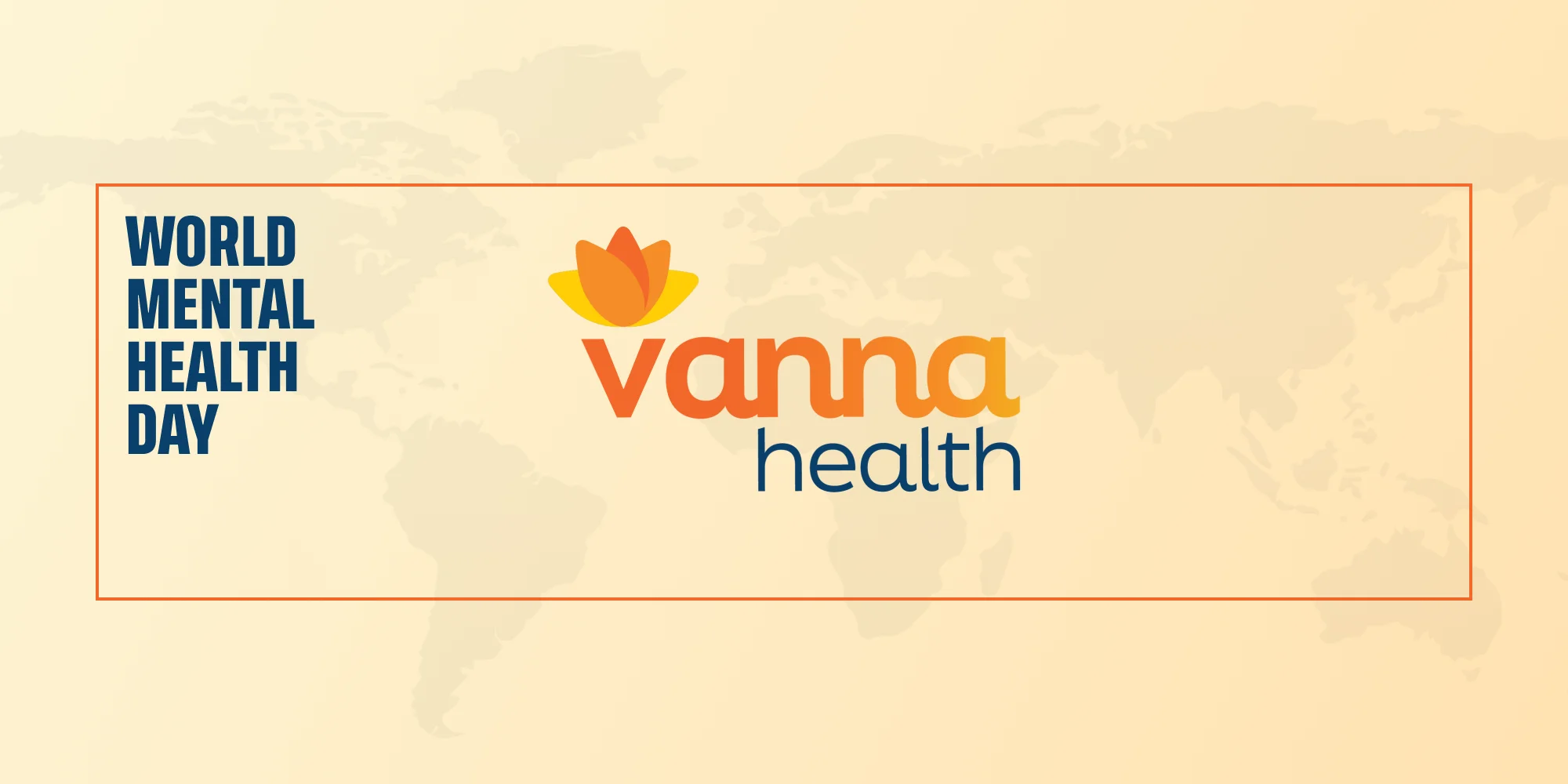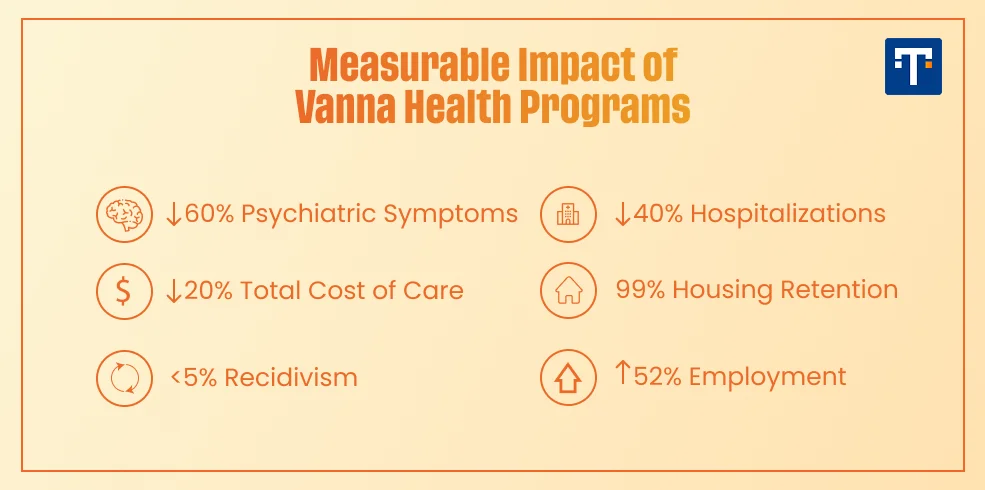Necessary Always Active
Necessary cookies are required to enable the basic features of this site, such as providing secure log-in or adjusting your consent preferences. These cookies do not store any personally identifiable data.
|
||||||
|
||||||
|
||||||
|

In Focus
With the world celebrating World Mental Health Day on 10 October worldwide, communities and organizations are coming together to raise awareness, promote mental health recovery, and highlight innovative approaches to support individuals living with serious mental illness. Mental health care in the United States has long faced a complex set of challenges, fragmented systems, limited access, and a lack of personalized support for those most in need. Amid these challenges, Vanna Health has emerged as a startup rethinking what sustainable community mental health recovery can look like.
Individuals living with serious mental illness (SMI) often navigate these barriers with little continuity of care, facing not just clinical struggles but also deep social and economic instability. Its model reflects growing awareness on World Mental Health Day 2025, advocating for mental health recovery awareness.
Vanna Health is a U.S.-based startup that is reshaping mental health care by focusing on community mental health recovery through building mental health communities and community wellness support. Vanna Health was founded in 2021 by Dr. Thomas Insel, former director of the National Institute of Mental Health, and Dr. Giovanni Colella, a serial entrepreneur.
Unlike traditional programs that emphasize only clinical treatment, Vanna Health addresses the broader challenges that individuals with serious mental illness (SMI) face in their daily lives, including social isolation, unstable housing, and limited access to employment or community activities.
At the heart of Vanna Health’s model is a combination of personalized coaching, peer-led recovery programs, clubhouse-based activities, and technology integration. These components work together to ensure that members receive structured guidance while also developing meaningful social connections.
The organization’s approach is grounded in the principle that holistic mental health recovery models in the US are most effective when they encompass both mental health treatment and social support.
Vanna Health operates with a clear mission: to empower individuals with SMI by providing support that promotes purpose, belonging, personal growth, and community mental health recovery. The organization’s core values are reflected in every aspect of its programs, from coaching to community engagement and technology use.
Core Values in Action:
Related Post – How Telehealth is Changing the Way We Access Medical Care
Vanna Health delivers an integrated range of services that bridge clinical care and social rehabilitation. Each component of its model is designed to help individuals with serious mental illness (SMI) gain stability, build resilience, and re-engage with their communities. The startup combines evidence-informed practices with lived experience, ensuring that members receive support that feels both practical and personal.
At the foundation of Vanna Health’s services lies personalized, one-on-one coaching. Each member is paired with a local coach who provides hands-on guidance, encouragement, and problem-solving support. Unlike traditional case managers, Vanna’s coaches are often individuals who have lived through similar challenges, including recovery from mental illness, substance use, or prior justice involvement.
This shared experience creates a powerful bond of trust and understanding between coach and member. Coaches engage in proactive outreach, helping individuals navigate everyday challenges like finding safe housing, arranging transportation, or scheduling appointments, reinforcing community mental health recovery.
The one-on-one coaching model is built around flexibility. Coaches adapt to each member’s progress, setting realistic goals that align with personal aspirations, whether that means securing employment, reconnecting with family, or participating in Vanna Health community programs.
Vanna Health’s peer support pods form the social backbone of its care model. These small, intimate groups, typically three to five members, are designed to foster accountability, camaraderie, and shared growth. Each pod brings together individuals with similar interests, recovery goals, or backgrounds, creating an environment where members can learn from one another’s experiences and support mental health recovery awareness.
Peer pods function as a safe space for open communication and emotional support. Members motivate each other, share successes, and collaborate on challenges, whether related to daily routines, employment, or personal development.
Vanna Health collaborates closely with the Clubhouse Model, a globally recognized approach to psychosocial rehabilitation. Clubhouses are community centers run by and for individuals with mental health challenges, offering a structured daily environment where members can participate in productive activities and rediscover a sense of purpose.
Through these partnerships, Vanna Health helps members access clubhouses that provide:
This model moves beyond treatment to focus on life-building, helping members find value in their daily routines, contribute to the community, and pursue employment or education, exemplifying building mental health communities. It offers an environment that bridges community mental health recovery and real-world engagement.
To tie these human-centered services together, Vanna Health developed Vanna Connect, a purpose-built digital platform that integrates with electronic health record (EHR) systems. The platform enables seamless communication between payers, providers, and accountable care organizations (ACOs), allowing teams to deliver coordinated and consistent care while promoting digital mental health innovation.
Vanna Connect ensures that each member’s care plan remains aligned with their goals and progress. It tracks outcomes, identifies gaps in care, and provides real-time updates to stakeholders involved in community mental health recovery.
Platform Capabilities:

Vanna Health does not publicly list pricing for its services. Instead, the organization operates through partnerships with payers, providers, and accountable care organizations. These partnerships enable cost-sharing and ensure that members receive support regardless of individual financial capacity.
The 20% reduction in total cost of care reported by Vanna Health suggests that its model is not only effective but also economically efficient. By reducing hospitalizations and improving housing stability and employment, the organization minimizes expensive emergency interventions and creates long-term value for healthcare systems and community wellness support initiatives.
Delivering high-quality care for individuals with serious mental illness (SMI) comes with inherent complexities. Unlike conventional healthcare programs that follow standardized procedures, Vanna Health’s model emphasizes personalization, human connection, and community engagement,essential elements for community mental health recovery, but demanding to sustain at scale.
One of the biggest challenges Vanna Health faces is balancing scalability with individualized care. The strength of the company’s model lies in its personal touch, where every member receives guidance from a coach who understands their local environment, personal struggles, and long-term goals.
The mental health startup addresses this challenge by investing in comprehensive training programs for coaches and building strong local partnerships that ensure culturally sensitive and regionally relevant support. Even so, scaling a relationship-based care model demands ongoing digital mental health innovation and quality assurance.
Members of Vanna Health often face complex social determinants of health, factors beyond clinical symptoms that influence well-being. Housing instability, unemployment, limited transportation options, and social isolation are persistent barriers that can hinder consistent engagement in peer-led recovery programs and other community mental health recovery activities.
Vanna Health addresses these barriers by embedding social support directly into its services. Coaches not only help members navigate healthcare systems but also connect them with local housing authorities, transportation options, and employment resources. Peer pods and clubhouse activities further mitigate isolation by fostering belonging and purpose, consistent with support networks for schizophrenia.
Engagement is the heartbeat of Vanna Health’s model. For members to achieve measurable improvements, they must actively participate in coaching sessions, peer pods, and clubhouse programs. However, sustaining this engagement can be difficult, particularly for individuals experiencing severe symptoms or fluctuating motivation levels.
Vanna Health employs a proactive and compassionate outreach strategy, where coaches check in regularly, celebrate small victories, and adapt their approach to match each member’s readiness and energy. Peer pods also act as an anchor, providing consistent social contact and encouragement, central to mental health recovery awareness.
Vanna Connect, the digital platform that underpins the company’s care coordination, represents both an advantage and a challenge. While it enhances communication and data sharing between providers, payers, and coaches, successful adoption requires consistent training and technical support across all partners.
For some organizations, especially those with limited digital infrastructure, integrating new systems can be resource-intensive. Ensuring that every stakeholder understands how to use the platform effectively, while maintaining compliance with privacy regulations, adds another layer of complexity for sustaining community mental health recovery at scale. Recently, Social media platforms- Snapchat, Meta, and TikTok- have launched Thrive Mental Health Initiative.
Vanna Health demonstrates that mental health care can be effective, measurable, and deeply human. By combining personalized coaching, peer-led recovery programs, peer support pods, clubhouse engagement, and technology, the organization addresses both clinical and social needs of individuals with SMI, creating a model for community mental health recovery. Not just that, TikTok has unveiled a meditation feature to promote wellness and prevent late-night scrolling by users.

Sign up to receive our newsletter featuring the latest tech trends, in-depth articles, and exclusive insights. Stay ahead of the curve!